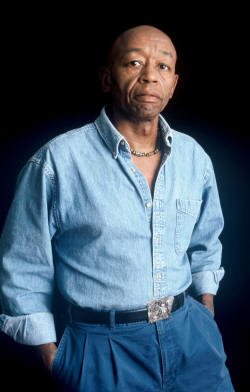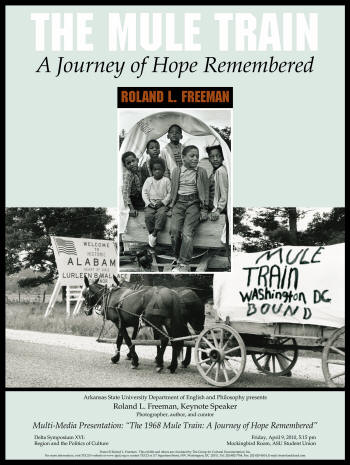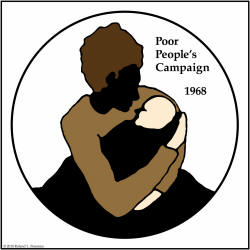University
Communications
Office
Arkansas State University
Jonesboro,
Arkansas
Staff
Markham Howe
Sara McNeil
Gina Bowman
(870) 972-3056
fax (870) 972-3693
More information:
NewsPage
Links to News Releases
& Announcements
KASU
Public Newsroom
KASU Local News
Campus Calendar
Public activities at ASU
About
ASU
Overview, history
and more |
Photographer Roland Freeman to
provide April 9 keynote address at ASU's Delta Symposium XVI
March 15, 2010
--
Noted photographer and writer
Roland L. Freeman will
speak on Friday, April
9, at 5:15 p.m. at ASU’s Delta Symposium XVI: Region and the Politics of
Culture. Freeman will give a photo lecture on his documentation of the
Civil Rights March in his presentation, “The Mule Train: A Journey of Hope Remembered.” The
lecture is free and open to the public. It will take place in the
Mockingbird Room of ASU’s Reng Student Services Center/Student Union,
101 N. Caraway Road, Jonesboro.
his presentation, “The Mule Train: A Journey of Hope Remembered.” The
lecture is free and open to the public. It will take place in the
Mockingbird Room of ASU’s Reng Student Services Center/Student Union,
101 N. Caraway Road, Jonesboro.
Freeman’s presentation will showcase photographs he made during the
historic Civil Rights march called “The
Mule Train.” The Mule Train was a major
march that contributed to the “Poor People’s Campaign” during the summer
of 1968. The march began in the Mississippi Delta in Marks, Miss., with
a journey that started with mule-drawn wagons. Freeman’s work is
especially important because his photographs are the major visual record
of this aspect of the Civil Rights Movement, and they tell the story of
the march from the perspective of Freeman’s own participation in this
event.
Freeman is
the founder and president
of The Group for Cultural
Documentation (TGCD), a publicly supported tax-exempt organization
established in 1991 to contribute to the strength of this nation through
the understanding, preserving, and bridging of cultural identities and
traditions. TGCD creates opportunities to support individuals and
groups of diverse backgrounds and experiences in developing the
understanding and communication skills necessary to function more
effectively within the broader society.
Freeman is
a Washington, D.C.-based freelance photographer, whose work has been
published widely and exhibited throughout the wo rld,
often along with quilts and other artifacts from his modest collection
of work by African Americans. He was the first photographer to be
awarded a Young Humanist Fellowship by the National Endowment for the
Humanities(1970), he has received two Masters of Photography Visual Arts
Fellowships from the National Endowment for the Arts (1982, 1991), he is
the recipient of the Living Legend Award for Distinguished Achievement
in Photography from the National Black Arts Festival (1994), and he
holds an honorary doctorate in humane letters from Millsaps College
(Jackson, Miss., 1997). Freeman was also awarded the prestigious
National
Heritage Fellowship from the National Endowment for the Arts (2007),
the nation's highest honor in the folk and traditional arts. rld,
often along with quilts and other artifacts from his modest collection
of work by African Americans. He was the first photographer to be
awarded a Young Humanist Fellowship by the National Endowment for the
Humanities(1970), he has received two Masters of Photography Visual Arts
Fellowships from the National Endowment for the Arts (1982, 1991), he is
the recipient of the Living Legend Award for Distinguished Achievement
in Photography from the National Black Arts Festival (1994), and he
holds an honorary doctorate in humane letters from Millsaps College
(Jackson, Miss., 1997). Freeman was also awarded the prestigious
National
Heritage Fellowship from the National Endowment for the Arts (2007),
the nation's highest honor in the folk and traditional arts.
Freeman, a native of Baltimore, Maryland, began his professional career
in the 1960s, photographing the Civil Rights Movement. Freeman gained
his initiation into documentary photography through his apprenticeship
and friendship with the groundbreaking African-American photographer
Gordon Parks.
Freeman's assignments since then have emphasized photojournalism,
commercial work, and photo-documentation. He has been a research
associate for the Smithsonian Institution’s Center for Folklife and
Cultural Heritage since 1972, a faculty member at several universities,
and during 1997, the Eudora Welty Visiting Professor of Southern Studies
at Millsaps College.
A major emphasis of Freeman’s work is his ongoing self-assigned project,
“While There Is Still Time,” a study of Black culture throughout the
African Diaspora that uses the camera as a tool to research, document,
and interpret the continuity of traditional African American folklife
practices. This work is generally done in close collaboration with
folklorists, historians, sociologists, and community activists, often in
methodologically innovative ways that have been integral to his
contributions to the work of photographers of his generation.
Books by Freeman include: “Something To Keep You Warm: The Roland
Freeman Collection of Black American Quilts from the Mississippi
Heartland” (Mississippi Department of Archives and History, 1979); “Southern Roads/City Pavements:
Photographs of Black Americans” (International Center of
Photography, New York, NY, 1981); “Stand By Me: African American
Expressive Culture in Philadelphia” (Smithsonian Institution’s
Office of Folklife Programs, 1989); “The Arabbers of Baltimore”
(Tidewater Publishers, Centreville, MD, 1989); “Margaret Walker’s ‘For
My People’: A Tribute, Photographs by Roland L. Freeman”
(University Press of Mississippi, Jackson and London, 1992); “A
Communion of the Spirits: African-American Quilters, Preservers, and
Their Stories” (Rutledge Hill Press, Nashville, TN, 1996); and
“The
Mule Train: A Journey of Hope Remembered”
(Rutledge Hill Press, Nashville, TN, 1998). Each has been accompanied by
a national/international touring exhibit. “Fire in My Bones:
Transcendence and the Holy Spirit in African American Gospel” by Glenn
Hinson, photographs by Roland L. Freeman (University of Pennsylvania,
2000), won the Chicago Folklore Prize, an international award
recognizing the most significant book in the discipline for the year.
Freeman’s latest book is a collective biography entitled, “A Tribute to
Worth Long, Still on the Case: A Pioneer’s Continuing Commitment”
(The Group for Cultural Documentation and the Smithsonian Center for
Folklife and Cultural Heritage, 2006).
of Archives and History, 1979); “Southern Roads/City Pavements:
Photographs of Black Americans” (International Center of
Photography, New York, NY, 1981); “Stand By Me: African American
Expressive Culture in Philadelphia” (Smithsonian Institution’s
Office of Folklife Programs, 1989); “The Arabbers of Baltimore”
(Tidewater Publishers, Centreville, MD, 1989); “Margaret Walker’s ‘For
My People’: A Tribute, Photographs by Roland L. Freeman”
(University Press of Mississippi, Jackson and London, 1992); “A
Communion of the Spirits: African-American Quilters, Preservers, and
Their Stories” (Rutledge Hill Press, Nashville, TN, 1996); and
“The
Mule Train: A Journey of Hope Remembered”
(Rutledge Hill Press, Nashville, TN, 1998). Each has been accompanied by
a national/international touring exhibit. “Fire in My Bones:
Transcendence and the Holy Spirit in African American Gospel” by Glenn
Hinson, photographs by Roland L. Freeman (University of Pennsylvania,
2000), won the Chicago Folklore Prize, an international award
recognizing the most significant book in the discipline for the year.
Freeman’s latest book is a collective biography entitled, “A Tribute to
Worth Long, Still on the Case: A Pioneer’s Continuing Commitment”
(The Group for Cultural Documentation and the Smithsonian Center for
Folklife and Cultural Heritage, 2006).
Freeman’s presentation is integral to this year’s Delta Symposium, April
7-10. Other featured presenters include the scholar Dr. Trudier Harris,
poet Ed Madden, and bluesman Bobby Rush. For more information, contact
Dr. Gregory Hansen (ghansen@astate.edu),
Department of English and Philosophy, Symposium Committee, at (870)
972-3043.
Photos: All images on this page are courtesy of
Roland L. Freeman.
From top: Self-portrait, Roland L. Freeman, Mule Train book jacket
cover, and
Poor People's seal, all (c) 2010
Roland L. Freeman.
# # #
|
